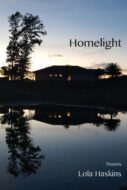 Homelight
Homelight
Lola Haskins
Charlotte Lit Press
Reviewer: Lee Rossi
Lola Haskins, who has published 14 books of poetry as well as 3 prose volumes, is a poet whose left brain is quite as active as her right. (Haskins, you should know, taught computer science for three decades at the University of Florida.) Not long ago, she was asked if an AI could write poetry, and what she answered was revealing: “we don’t know how to code emotion, intuition, and understanding of context,” she told the interviewer. “And they’re essential. The first is what makes the reader feel something. The second enables the leaps that when you read them leave you breathless for days. And without the combination of those two and the third, poetic wit and humor would be impossible.” Notice the well-honed logic of her argument. Reason #1, reason #2, reason #3—the way a thoughtful, deeply sensitive engineer or computer analyst might think.
But lest you dismiss her as a nerd in tie-dye and cape, consider the first section of her new book, Homelight, disarmingly titled “On the Shoulders of Giants.” A series of tributes (what Robert Lowell called “Imitations”) ranging from Sappho and Blake to Mary Oliver and W.S. Merwin, they offer readers a brief overview of Haskins’ allegiances. Nature, birds especially, feature prominently in this and the other sections of the book. In “The Watcher” (after Mary Oliver) we encounter “Fourteen red-crowned cranes [grazing] on the edge / of the wetland … They dip into / the sunlit dark-blue water, swallow, dip again … Who am I,” she asks, “to understand any of this?” Oliver, I think, would recognize a kindred spirit. And what about “At Sixty” (after Rilke), where among other affirmations, we find this: “Whoever has not spread her thighs will not love that small creek.” Nature, in Haskins’ imagination, is not just a collection of physical facts but Life itself, EROS in caps.
The next section, “Wings,” makes explicit her fascination with our latterday dinosaurs, the original extraterrestrials, reminding us how incomensurate their reptilean ways are with the ways of the anthropoid. Of course, Haskins has more on her mind than keen description and thrilling metaphor. In “The Cranes” she recounts a dream in which her mother abandons her in a “sun-wet” plaza where she meets “a tall priest,” who transforms into a crane: “I can still see / his spread gray wings / and hear his call, made / not of words but of // clatter and trill.” One can hear her yearning. She would be a bird, if she could, or at the very least a poet.
Knowing the malleability of all living and imagined things, Haskins offers not just transformation but transcendence. In the short poem “Seeing God” we meet an unnamed raptor, polished by the sun: “It bronzes the claws that quiet the struggling creatures / he lifts towards the angels, whose hands are trembling with hunger.” This is not the God, nor especially the angels, I learned about in Catholic school, but something much more visceral and pantheistic.
For all the deep seriousness of many of her poems, Haskins sometimes indulges her sense of humor, as in “Ask an Ornithologist.” What’s the word for a flock of goldfinches she asks her resident expert: “The collective term for goldfinches,” she tells her, “is ‘mint’ unless you encounter the birds after sunset, in which case it is ‘after-dinner mint.’” Chuckle, chuckle!
The poems range widely: we find elegies and protest, friends, family, old age and loss, all grounded in a life lived richly, with attention and care. Haskins even finds time for reflections on the lived experience of what she might call her least interesting subject, herself. In a poem titled “The Slapped Girl” she remembers picking up a stone when she was a child: “At home, / I’d clean it and / cradle it in my hand.” And then, almost miraculously, she adds, “Sometimes it / would tremble me, / how safe it seemed.” Only someone who seldom felt safe might write those last lines. She wishes to be a stone, impervious, unfeeling, and yet is astonished by her own gentleness, her own vulnerability.
Equally evocative but more sardonic is “The Skunk,” which I read as an allegory of sexual politics. Fifteen years before she left G (lover? husband? partner?, she doesn’t say), he gave her a skunk, which immediately bit her. “I should have known then,” she admits. “But I didn’t, because once you get the idea something’s what you want, it doesn’t matter.” Harsher words were never spoken, at least as regards the self.
Similarly, when she meets W, “the new man,” he leaves her sitting in a restaurant because he needs to do his laundry. What do you do, she asks the reader and her self? “[Y]ou’ll wait. You’ll memorize the menu.” Bad as all this is, it gets worse: “The skunk was supposed to be de-scented.” And W was supposed to take his meds. Men are animals, she admits ruefully: “By the end, he might as well have been stray, he might as well have been living under the house.” Granted, I don’t recognize myself in either of these portraits, but maybe that was me a few lifetimes ago.
Compelling as these more personal poems are, Haskins concludes her book with a series of terse meditations on loss and mortality. “Rehearsing,” for instance, is a tiny, terrifying lullaby. (I quote it in its entirety.)
When you were little,
I’d lullaby you every night,
stroking your back
lighter and lighter
until I was feathers
until I didn’t exist.
Haskins is seldom windy or grandiloquent. Like her earlier books, this volume demonstrates the economy and care of her writing. And yet these poems reverberate in the echo chamber of the heart, offering renewal and refreshment on multiple readings.

